فراخوان مجلات و کتابهای بین المللی
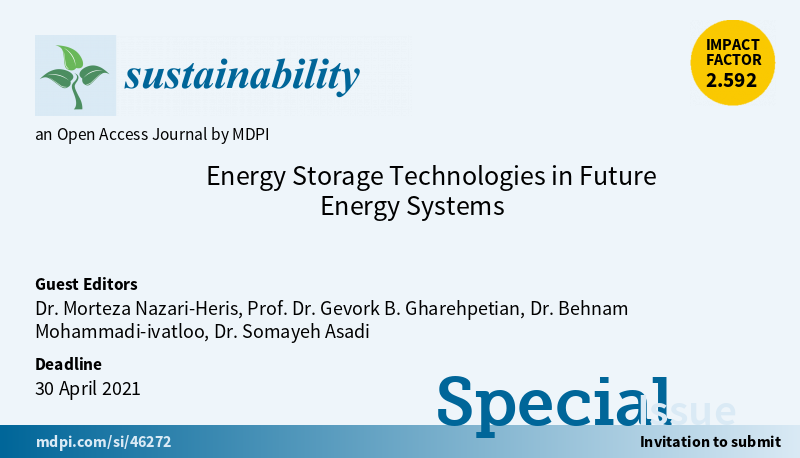
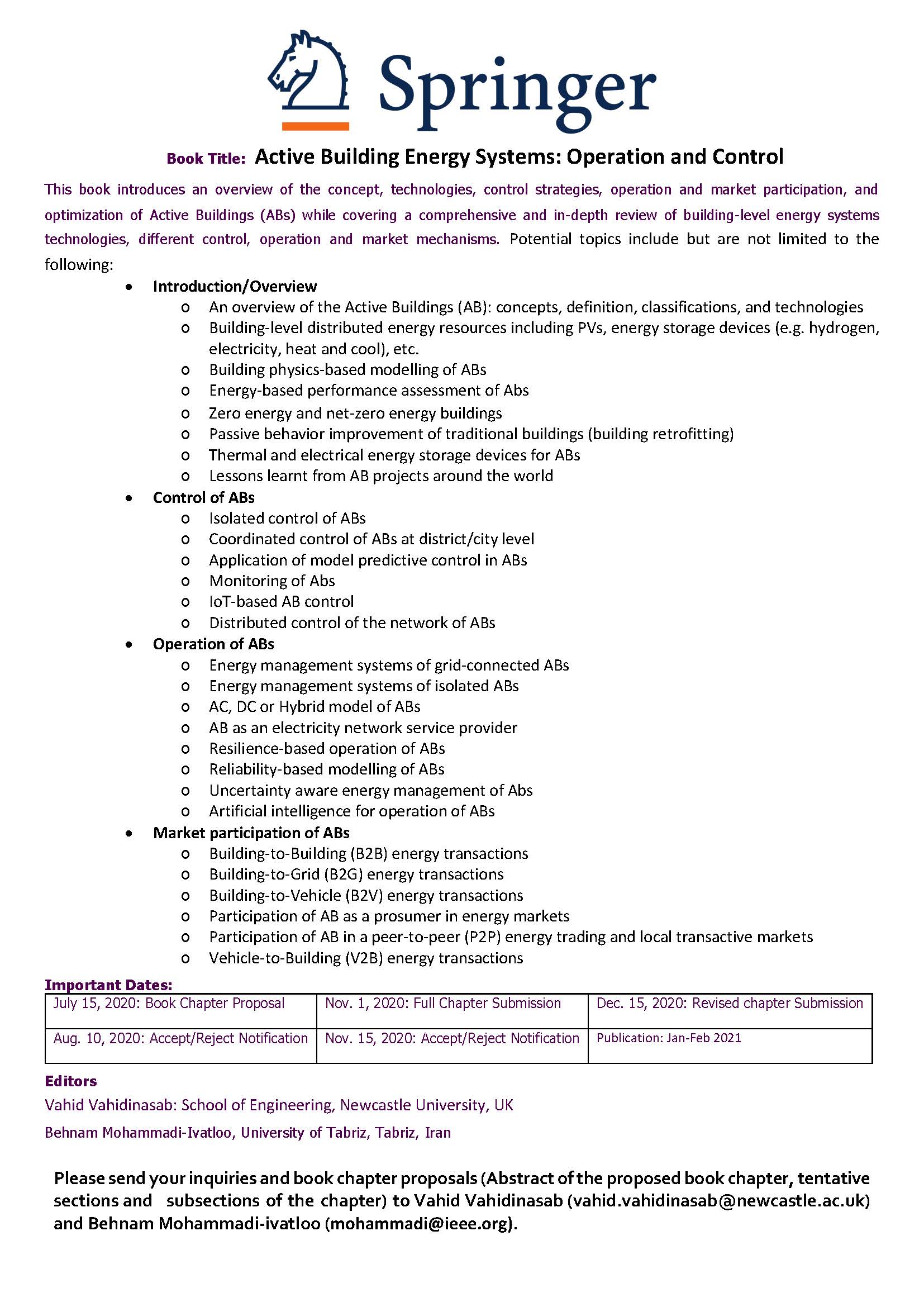
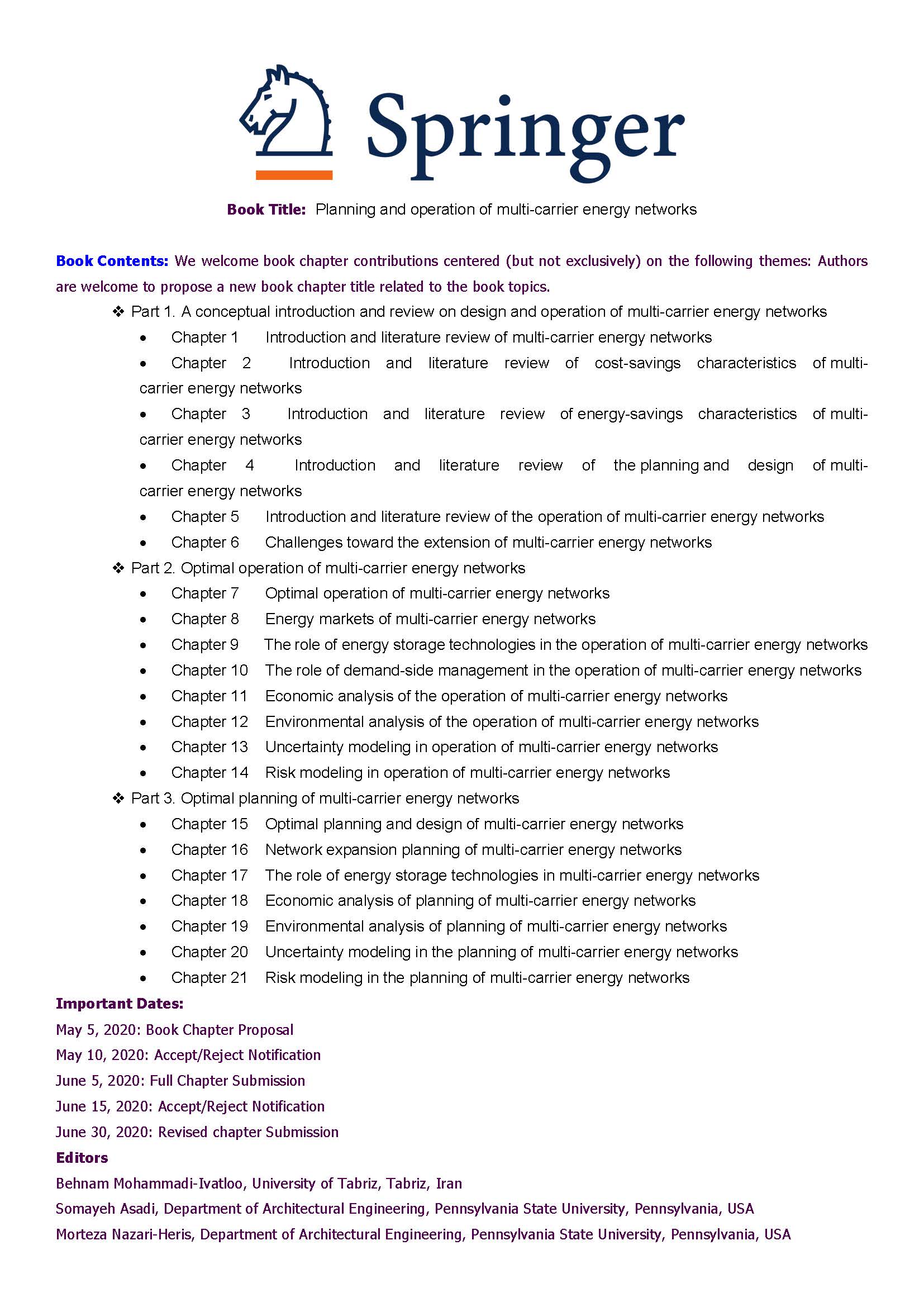
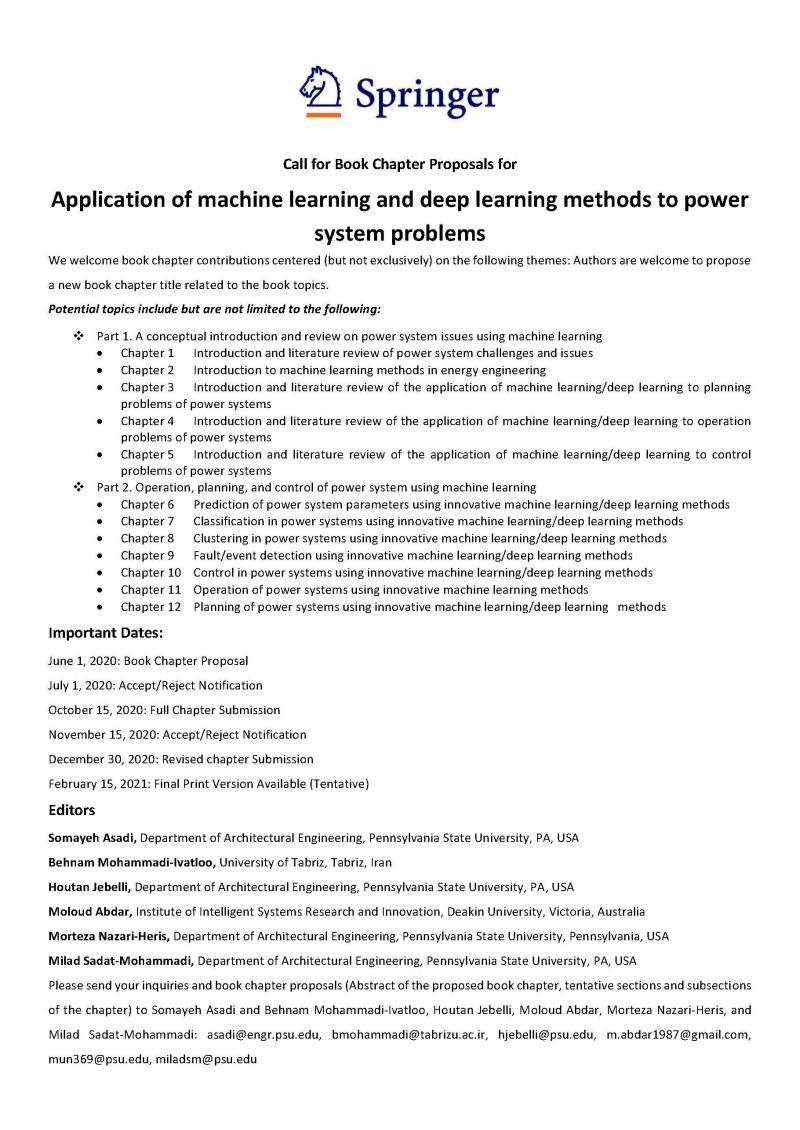
- You are invited to submit chapter proposal to Springer Book " Microgrids: Advances in Operation, Control, and Protection " Please see the detail in the attached file. Let me know if you have any comments or questions.
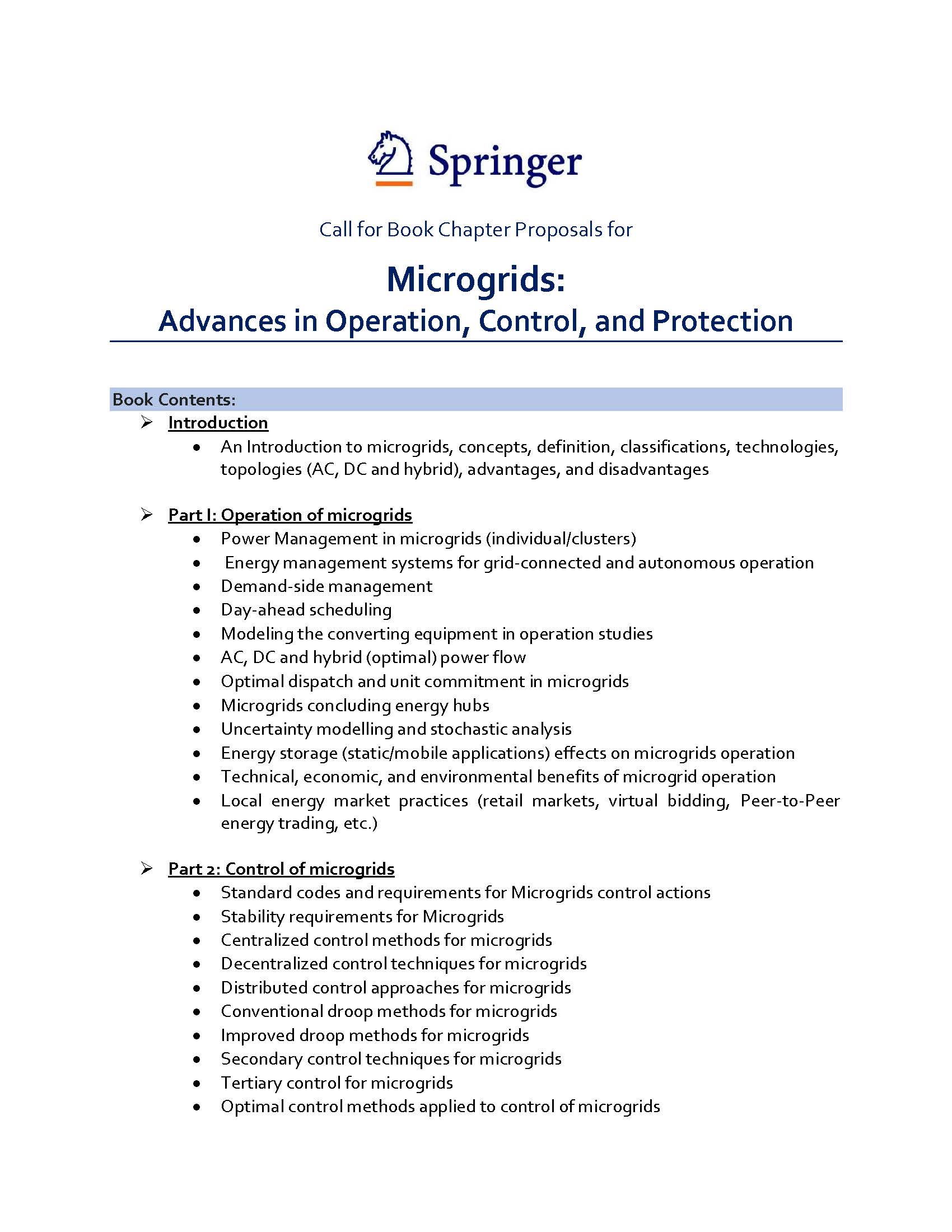
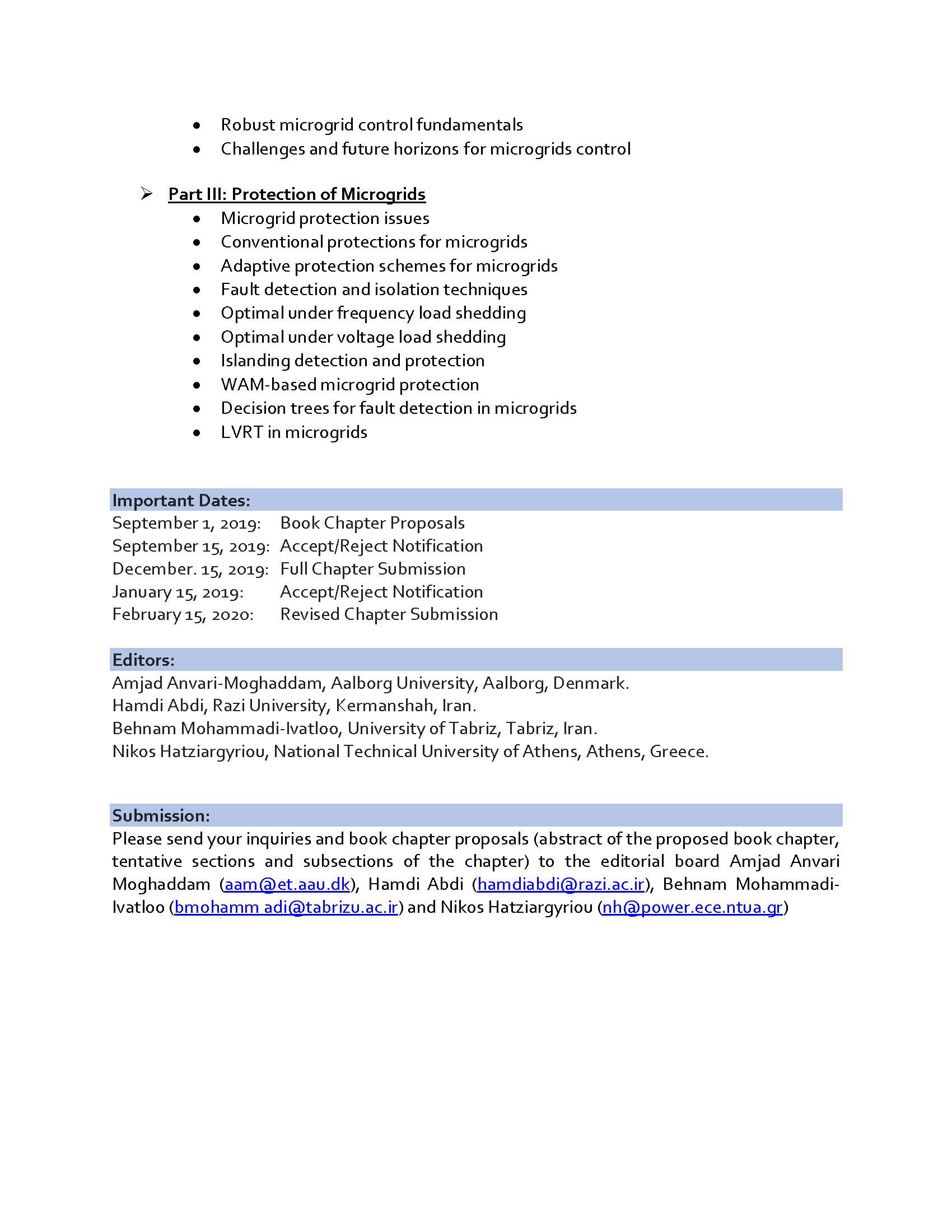
- We are editing a new book for Elsevier on Energy Storage in Energy Markets. If you are working in a similar field and interested in participation, just let me know!
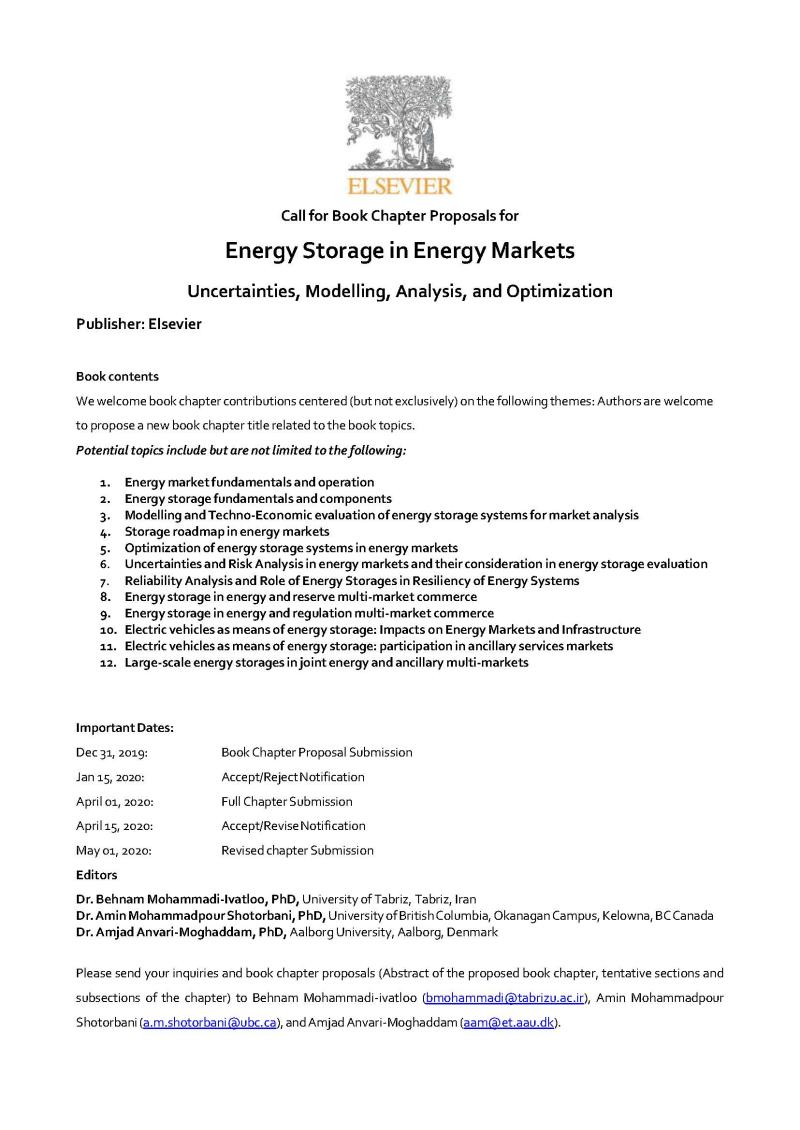
Call for Book Chapter Proposals for Springer Integration of Clean and Sustainable Energy Resources and Storage in Multi-Generation Systems - Design, Modeling and Robust Optimization
Editors
Farkhondeh Jabari, Faculty of Electrical and Computer Engineering, University of Tabriz, Tabriz, Iran
Behnam Mohammadi-ivatloo, Faculty of Electrical and Computer Engineering, University of Tabriz, Tabriz, Iran
Mousa Mohammadpourfard, Faculty of Chemical and Petroleum Engineering, University of Tabriz, Tabriz, Iran
Synopsis
Nowadays, water and energy crises are increasing because of world population growth, variations of consumer habits, limited fossil fuel reserves and global warming. Beside, poly-generation microgrids can provide electricity, heat, cool, potable water, and hydrogen demands close to end-users with no need to transmission. This leads to (i) a significant reduction in transmission and distribution costs: which represent about 30% of costs associated with supply and local connections do not present high capital costs and energy losses of long distances distribution lines; (ii) energy dissipation reduction: piping and conversion devices dissipate almost 6% of produced energy; (iii) efficiency improvement: simultaneous supply of electrical, cooling and heat demands allows to reduce energy waste, improving system overall efficiency; since cool and heat transport is more difficult than electricity (production close to users is essential); (iv) integration of renewable energies with traditional generation facilities: use of clean and sustainable energy sources such as solar, ocean thermal, wind, tidal, wave, hydrokinetic (marine and river current), hydro, geothermal, and biomass reduces negative environmental effects of fossil fuels (global warming, ozone layer depletion, ground-level ozone formation, pollution, and acid rains). Reliability and consistency is a significant drawback with respect to some of renewable energy sources. Atmospheric conditions and geographical locations make a huge impact on effectiveness of solar, wind, tidal, etc. Therefore, incorporation of chemical, electrochemical, electrical, mechanical, thermal and ice energy storages with renewable energy based multi-generation systems overcomes uncertainties associated with daily and seasonal fluctuations of renewables.
Each chapter of this book will focus on energy, exergy, economic and environmental (4E) analyses of a novel combined cooling/heating/pure water/hydrogen/power generation system. In other words, different multi-generation microgrids such as cogeneration, trigeneration and poly-generation systems, which are driven by clean and sustainable energy sources and supported by storage devices, will be presented. Robustness, effectiveness and applicability of each system will be revealed by simulation on a benchmark consumer or a real case study without and with application of storage facilities. Firstly, a comprehensive literature review will be presented in each chapter. Then, the specific novelties of the chapter will be presented clearly. Afterwards, thermodynamic design and mathematical problem formulation will be provided for modeling system. Case study, numerical results and discussions will be presented for each proposed chapter. Then, concluding remarks and future trends of each microgrid will be expressed. Finally, nomenclature and references will be listed. This book will be helpful for undergraduate and graduate students, researchers, and engineers, trying to design and evaluate different zero-energy and zero-emission stand-alone grids.
Book contents
Book title: Operation, Planning and Analysis of Energy Storage Systems in Smart Energy Hubs (Future Power Systems)
Foreword: Edited by Farkhondeh Jabari, Behnam Mohammadi-ivatloo, Mousa Mohammadpourfard
Acknowledgment: Edited by Farkhondeh Jabari, Behnam Mohammadi-ivatloo, Mousa Mohammadpourfard
Introduction: Edited by Farkhondeh Jabari, Behnam Mohammadi-ivatloo, Mousa Mohammadpourfard
Part I: A conceptual introduction to zero-energy and zero-emission microgrids
Chapter 1: Definition of multi-generation systems
Chapter 2: Economic and environmental benefits of renewable energy sources in combined cooling, heating, potable water, hydrogen, and power generation systems
Chapter 3: Selection of cost-effective and energy-efficient storages with respect to uncertain nature of renewable energy resources and variations of demands
Part II: Energy, exergy, economic and environmental analyses of poly-generation plants using clean fuels and energy storage technologies
Chapter 4: Solar powered combined cooling, heating, potable water, hydrogen, and power generation systems with application of ice storage/molten salt/batteries/electric and hydrogen vehicles, etc.
Chapter 5: Utilization of geothermal heat reservoirs of abandoned oil and gas wells for seawater purification and heat/cool/hydrogen/power generation taking into account thermal energy storage systems such as molten salt and etc.
Chapter 6: Application of hydro potential in seawater desalination, hydrogen and power generation facilities without and with application of pumped storage
Chapter 7: Bio-fueled poly-generation of heat, power and fresh water production system considering advanced adiabatic compressed air energy storage
Part III: Probabilistic performance assessment of renewable energy resources based multi-generation systems
Chapter 8: Information gap decision theory for risk-aversion and risk-seeker decision making processes in solar multi-generation systems
Chapter 9: Interval robust optimization of hydro driven combined drinking water and electricity generation systems
Chapter 10: Monte Carlo simulations for sizing ice cold thermal energy storage in solar powered trigeneration microgrids
Chapter 11: Point estimation method for modeling intermittency of solar irradiations in molten salt integrated solar poly-generation plants
Chapter 12: Fuzzy scenario based stochastic programming approach for making robust decisions in operation of biomass fired multi-generation plants
Chapter 13: Game theory application for finding optimal operating point of multi-production system under fluctuations of renewables and various load levels
Important Dates:
February 28, 2019: Submission of Book Chapter Proposal
March 14, 2019: Accept/Reject Notification
May 31, 2019: Full Chapter Submission
June 30, 2019: Accept/Reject/Revise NotificationJu
ly 31, 2019: Revised Chapter Submission
August 31, 2019: Final Print Version Available (Tentative)
:Please fill out the proposal form and send it to editors via email
f.jabari@tabrizu.ac.ir, bmohammadi@tabrizu.ac.ir, mohammadpour@tabrizu.ac.ir
Call for Book Chapter Proposals for
Food-Energy-Water Nexus: Resilience and Sustainable Development
Decision-Making Methods, Planning, Algorithms, and Trade-Off Analysis
Book Title
Food-Energy-Water Nexus: Resilience and Sustainable Development
Publisher: Springer
Synopsis
The increasing costs of energy and water, fossil fuel depletion, and food shortages caused by climate change have left us with no choice but to accelerate the world's transition to sustainability. In the coming decades, we are likely to see increasing pressure on the food, energy, and water (FEW) demands from increasing population and rising threat on the FEW supplies from climate change. As discussed in a recent report published by the International Renewable Energy Agency (IRENA), patterns of FEW systems are changing and the move to more sustainable supply systems may be inevitable. Increasing populations as well as resource scarcity challenge long-term FEW systems sustainability. Previously, many researchers had studied and analyzed sustainability across the FEW sectors in a fragmented and isolated way. Recent studies show that FEW systems are highly interconnected, and improving system function while ensuring sustainability cannot be borne by research on food, energy or water systems individually. More nexus-wide research is needed to pursue both understanding the behavior of FEW systems and developing technological enablers necessary to improve the system performance.
Book contents
We welcome book chapter contributions centered (but not exclusively) on the following themes: Authors are welcome to propose a new book chapter title related to the book topics.
Potential topics include but are not limited to the following:
Introduction to FEW nexus
Resiliency and sustainability definition in FEW systems
Planning of Interdependent Energy, water and food systems.
Decision-making tools for optimal operation of FEW systems
Modeling of EW and FEW systems
Sustainable design of EW and FEW systems
Sustainable operation of EW and FEW systems
Impact of renewable energy resources in EW and FEW systems
Renewable energy based water desalination systems
Net zero energy buildings: design and operation
Net zero water and waste buildings: design and operation
Renewable energy systems for agriculture applications
Security interactions of Food, Water and Energy systems
Challenges and opportunities of FEW nexus in the sustainable development of different countries
Impact of FEW nexus perspectives on managing agricultural droughts
An integrated modeling approach for FEW nexus management
Important Dates
December 25, 2018: Book Chapter Proposal
January 25, 2019: Accept/Reject Notification
May 30, 2019: Full Chapter Submission
July 15, 2019: Accept/Revise/Reject Notification
August 30, 2019: Revised chapter Submission
December 1, 2019: Final Print Version Available (Tentative)
Editors
Dr. Somayeh Asadi: Pennsylvania State University, University Park, PA 16801, USA
Dr. Behnam Mohammadi-ivatloo: University of Tabriz, Tabriz, Iran
Please send your inquiries and book chapter proposals (Abstract of the proposed book chapter, tentative sections and subsections of the chapter) to Somayeh Asadi and Behnam Mohammadi-ivatloo: asadi@engr.psu.edu, bmohammadi@tabrizu.ac.ir